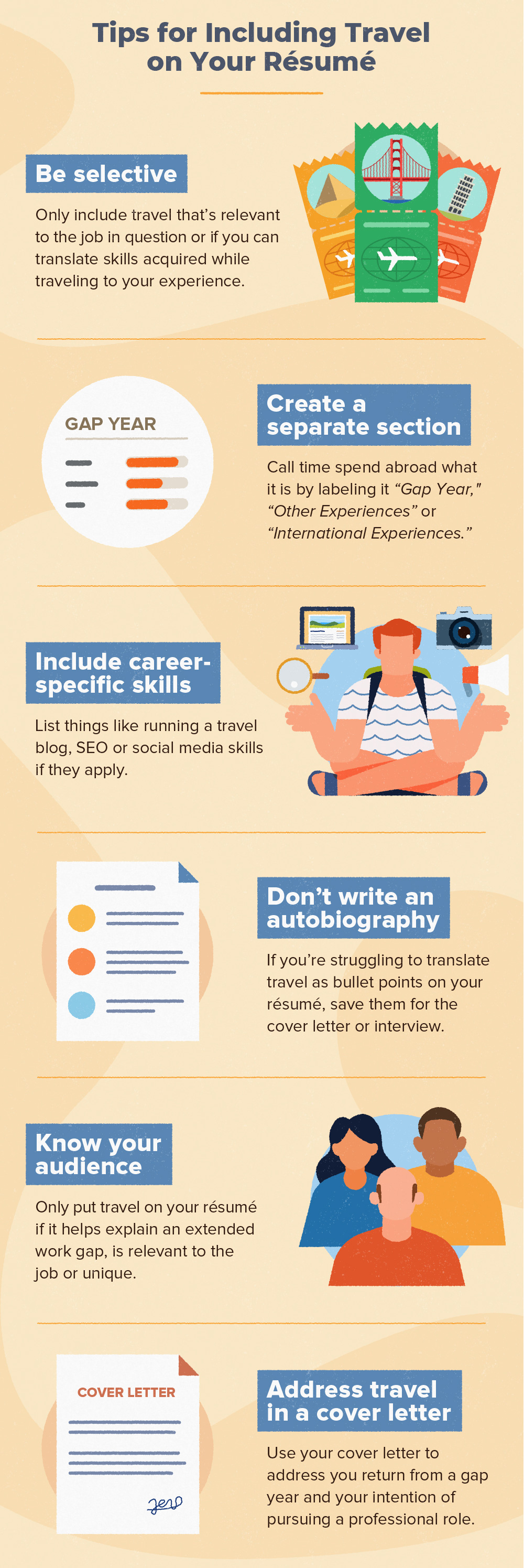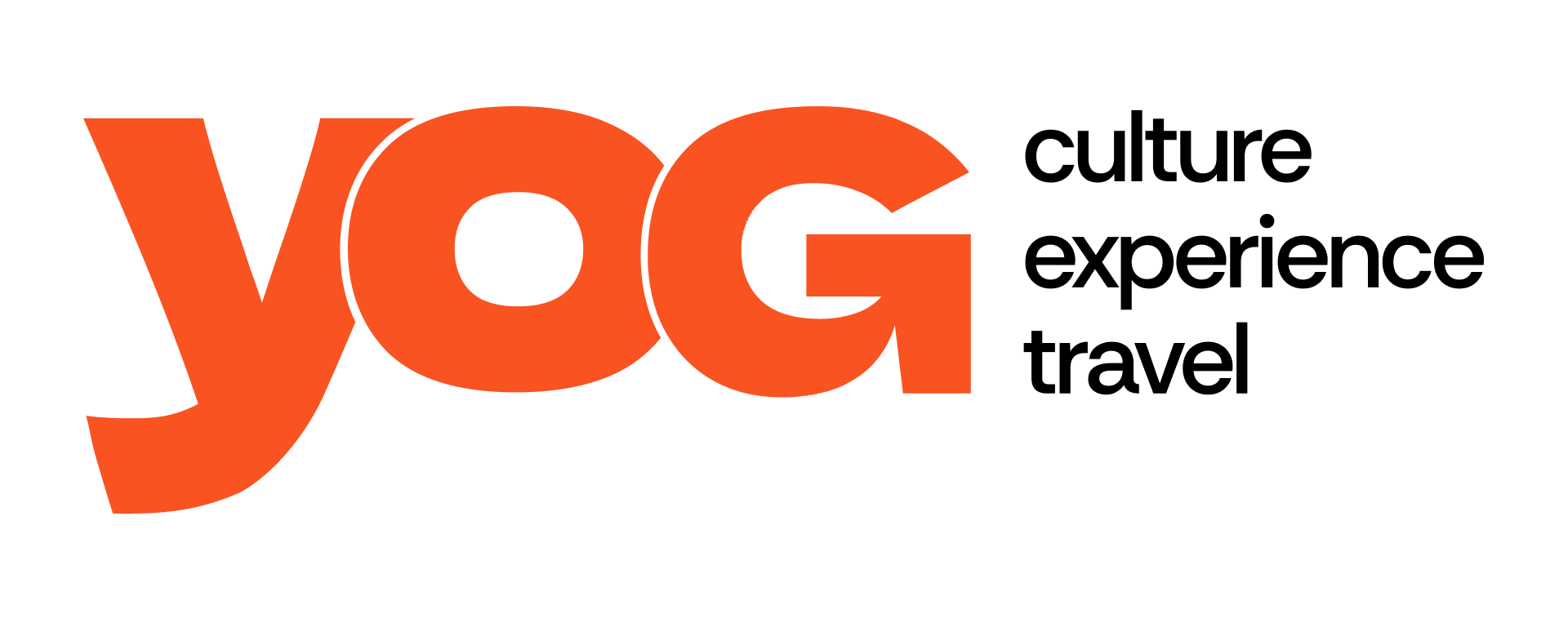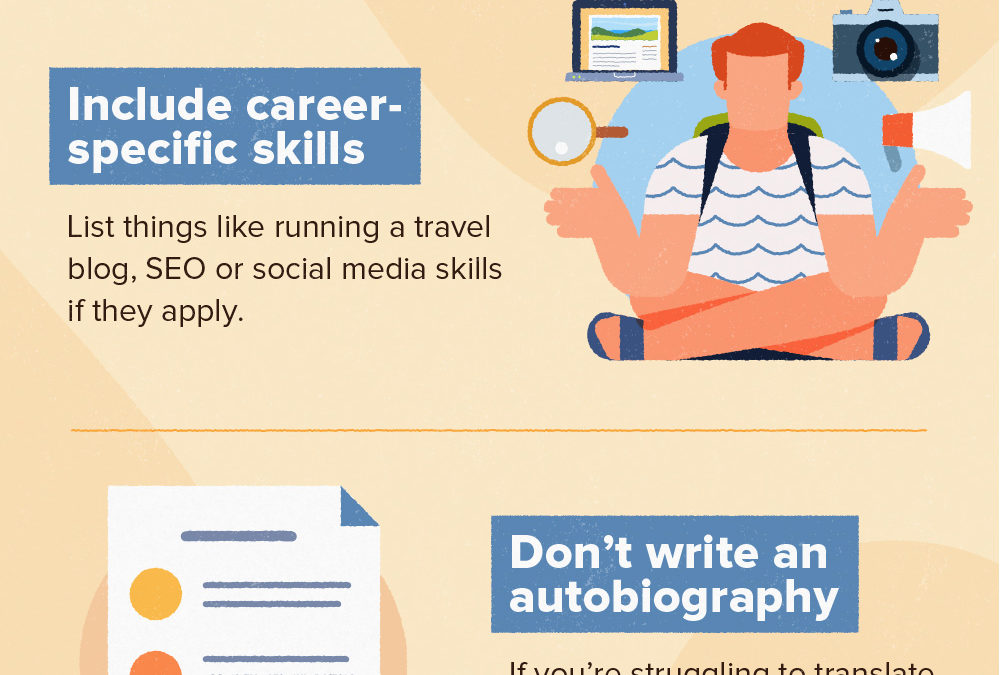Gap years have been around since the 1970’s but the last decade or two have seen more people than ever before deciding it’s an option for them. In a globalized world, businesses need experienced candidates who understand other cultures, speak another language or are willing to relocate. These are qualities you acquired on your travels or will do. If executed correctly, you can evidence the benefits of your travel on your cv or resume and give a professional boost.
This guide walks you through the process of how to ensure you sell the relevance and benefits of purposeful travel on your CV or application form. People reading these want to know quickly, what you have achieved and the kind of person you are. They are looking for something that stands out and separates you from the crowd of other applicants. After a gap year or career break you have all the ingredients, you just need to decide how to mix them all together.
Travel Experiences = Soft Skills (generally)
So how do you turn that time abroad into a tangible experience to showcase on a résumé? First of all, the vast majority of your travels aren’t really “experience”. They are soft skills you picked up on the road. Things like people skills, leadership lessons, confidence and independence.
While you might be tempted to include these things in your list of skills, don’t. You’ll sound cheesy and as though you’re just putting in useless filler. Instead, here are six tips to consider for including travel on your résumé.
Be selective about what you add to your résumé
First of all, not all travel is created equal. Spending a month sunbathing in the Algarve? Attending a full moon party on a beach in Phuket? Photographing old world churches on your summer Euro trip? These won’t convince an employer that your travel is relevant experience.
Call time spent abroad what it is
People often make the mistake of putting travel under the “Work Experience” section of their résumés. Since it’s not work, it’s not work experience. That said, don’t leave a gap in your résumé either. Instead, create a separate section called other experience and title it “Gap Year,” “Other Experiences” or “International Experiences.
Give yourself credit for your achievement
Did you run a travel blog while overseas, build a large following on Instagram or establish a photography portfolio? Chances are you picked up some content creation, SEO or social media marketing skills along the way that can be applicable to your résumé.
Don’t write an autobiography
More often than not, recounting the details of your travel experience story doesn’t translate well as bullet points on a one-page résumé. Make details of your experience impactful by providing interesting anecdotes that illustrates how you developed a relevant skill on the road.
Know your audience
Only put travel on your résumé if can explain how it is relevant to the job or you personal development. If all you did was party during your summer abroad, then it’s likely going to hurt you. However, if you volunteered at an ethical wildlife sanctuary in South Africa, then include it. If the job you are applying for requires extended travel, then definitely put it here.
Write a great cover letter
This is an opportunity to address the situation of your recent return from a gap year and your intention of pursuing a professional role. Incorporating the benefits of your travel experience in a cover letter can help you flesh out some of those points on your résumé.
continues after graphic….

Articulating Your Experience
Have you ever heard the saying, “it’s not about what you say, but how you say it”? This holds true when it comes to including travel on a résumé or, better yet, using it as an example during an interview question. It’s all about wording the experience correctly.
To do so, pick tangible skills you learned while abroad and translate those into work language.
Haggling = Negotiation skills.
Plan, finance and organize = Budgeting, planning and organization.
Getting stuck, changing route = Adaptability.
Experienced theft or money or passport? Self-reliance and independence.
Where you place abroad experience on your résumé is just as important as what you include. If your travel experiences are directly related to the job you’re applying for or your education, include them in the main body of your résumé. Otherwise, it’s best to create a separate section titled “Other Experience.”
Types of gap year
No matter how you choose to travel, you can always find a way to extract the skills you learned overseas and make them relevant for potential employers. Typically, gap year travel is portrayed in these ways on a résumé:
General Travel
Including details about general travel on your résumé won’t necessarily land you a job. However it’s a way to help set you apart from other candidates. If a competing candidate has similar qualifications, and an HR manager sees you’re adventurous, independent and interesting, you’re more likely to get the interview.
Gap year travel speaks to your character and serves as an indicator to an employer that you’re mature, independent and have worldly experience. You need to find a way to articulate this in your cv and/or covering letter.
1. Mention that set yourself some goals/targets for your travel. This could be countries visited, experiences and raising the money. e.g. I planned to travel for 4 months but managed to raise enough money to travel for 6 and I took the opportunity to visit Vietnam which wasn’t originally on my schedule.
2. Mention any stand-out experiences, where you got through an issue and learned more about yourself. e.g. I travelled alone to see a local festival but it was not in a tourist area. I engaged some locals and they directed me to the house of local politician. He kindly put me up for a night and invited me to attend an event. I introduced myself to other local dignitaries and talked about my travels.
3. State what made the trip worthwhile and how it has inspired you to apply for this job. e.g. I noticed that communities I visited had lots of waste lying around but also that individuals recycled what they found or collected it to make an income. That’s inspired me to understand more about how communities and businesses can work together to solve our waste problems in the UK
Teaching English
Teaching English as a second language (ESL), is not only a great way to live and make some money while traveling overseas. It can also be valuable work experience for your résumé.
If you’re applying for a job in education, this is a natural fit under your “Work Experience” section. If you’re applying to something completely unrelated to teaching, it can be more intimidating to include this on your résumé. Fear not — the same rules apply here as they do for other travel experiences. Try articulating this in a way that’s relevant to the role you’re applying to.
Did you collaborate with a local teacher? Teamwork and collaboration. Did you offer one-on-one instruction for a student that was struggling? Training and communication.
Volunteer Travel
As more companies place value on social responsibility, volunteering is a valuable detail that can make you stand apart from similar applicants. Volunteer experience can be included in its own section or under work experience:
- Either write “volunteer” as your title, followed by the name of the volunteer organization.
- Or create a title that summarizes what your volunteer role encompassed. Perhaps a development officer, head of fundraising or project manager describes the role. If you’re unsure about the title or feel strange about doing this, it’s always a good idea to ask the supervisor you worked with about the best way to word it.
- Describe what you did and what was achieved by your efforts (the outcome). e.g. I prepared lesson plans and taught 4 hrs a day for 3 months. All the students passed their english test at the end of the term.
Work & Training Placements
The work you did and what you achieved should be easily translatable to your CV under ‘Work Experience” and “Training” sections. Just remember to highlight any additional learning and skills you have gained by working overseas.
If you gained qualifications, show how you put these to use.
Work overseas generally involves dealing with other cultures, languages and ways of working so be sure to highlight these.

Study Abroad & Cultural Programs
Putting study abroad information on a résumé makes sense for the following scenarios:
- First résumé with no work experience
- Student résumé
- Recent graduate résumé
- Entry-level résumé
If you studied abroad during college, place travel experience under “Education.” Include the name of the school, courses you took and the date. Underneath, list a couple of bulleted points to expand on the course and what you gained by studying overseas.
If you undertook and arts or cultural programme you could include include under “Additional Learning and Development” on any résumé. You might focus on art appreciation, cultural awareness, political, social and cultural history, language development as the learning you have gained.
Foreign Languages Acquired While Travelling
Having foreign language skills is tremendously useful and highly demanded in the workplace. You can list any foreign languages under the “Skills” section of your résumé. If you speak more than 2 languages by birth or experience, label the section “Skills & Languages”. You can also include a certificated language course you took while traveling under “Education” and/or “Training”.
Remember, Tone is Important
No matter what you did during your gap year or extended travels, it all comes down to how you view your experiences and how you present them on your résumé. If you take your skills and experience seriously, then you’ll write and speak about them with conviction and in a manner that’s applicable to your potential employer.
Making the scenic drive from Los Angeles to Seattle? Contemplating a study abroad program, or getting back into the workforce after a year off? Now you’ll be able to evidence the benefits of travel on your CV.


